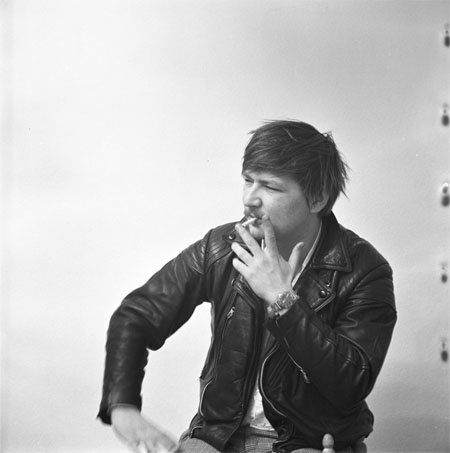Nearly every mention of Rainer Werner Fassbinder is going to be followed by numbers: 44 movies in 16 years. And throughout this month in Germany: 70. Events marking the anniversary of the birth, on May 31, 1945, of the filmmaker regarded by many in the country during his lifetime as a Bürgerschreck—an enfant terrible at best, if not an outright menace to society—begin today, and some will run throughout the summer.
Starting today in Munich, the Fassbinder Days feature a series of screenings, lectures and discussions through June 7, while in Berlin, the 52nd Theater Festival opens its Fassbinder TV-Room (through May 17), wherein rarely seen broadcasts of Fassbinder’s plays for television will be screened—as well as Christian Braad Thomsen’s Fassbinder: To Love Without Demands. Missing this documentary when it screened at the Berlinale frustrated me no end, so I look forward to catching it now. Ryan Gilbey, writing for the Guardian, found it “insightful,” noting that Thomsen, a Danish film historian, “became friends with Fassbinder in the early 1970s. The picture mixes well-chosen excerpts from the director’s work with previously unseen interview footage of him, hair plastered to his forehead, in a Cannes hotel room in 1978. He looks like a baby-faced trucker who hasn’t slept since the womb…. The trump card comes in the form of two latter-day interviews with Irm Hermann and Harry Baer, collaborators who recount their torment at Fassbinder’s hands with a stunned admiration that smacks of Stockholm syndrome.”
Juliane Lorenz, head of the Fassbinder Foundation (and Fassbinder’s editor in his final years), has an overview of the productions of Fassbinder’s work scheduled during the Theater Festival, including Susanne Kennedy’s “radical production” of Why Does Herr R. Run Amok?, Hakan Savaş Mican’s Ali: Fear Eats the Soul and Thomas Ostermeier’s The Marriage of Maria Braun. Lorenz also looks ahead to the publication of R.W. Fassbinder. Illustrated Catalog of Works 1969 – 1982. The Films and to forthcoming 4K restorations of “a number of Fassbinder film classics, including Love is Colder than Death and The Marriage of Maria Braun.”
On May 12, the Theater Festival presents screenings of The American Soldier (1970) and Pioneers in Ingolstadt (1971) preceded by Annekatrin Hendel’s new documentary, Fassbinder. At Perlentaucher, Thomas Groh finds the film, which’ll be traveling around the country and eventually broadcast on German television, to be an agreeable if not particularly probing overview of the life and work.
And then, on Wednesday, the main event, the opening of Fassbinder – NOW at Berlin’s Martin-Gropius-Bau. The exhibition was on view in Frankfurt in 2013, but here, it’ll be three times as large. Literally: 1200 square meters as opposed to 400, enough, for example, to provide an entire room for a special focus on Fassbinder’s costume designer, Barbara Baum.
Now then, as for the work itself, three entries here in Keyframe might serve as an index to relatively recent critical appreciation of the oeuvre: “Early Fassbinder,” from 2013, and last year’s entries on the Film Society of Lincoln Center’s massive retrospective, Fassbinder: Romantic Anarchist, parts 1 and 2.
Meantime, keep an eye on this entry for updates throughout the month.
Updates, 5/31: On Tuesday, Criterion released The Merchant of Four Seasons (1971) on DVD and Blu-ray. It “was Rainer Werner Fassbinder’s breakthrough,” writes Josef Braun, “made and released in 1971, following Fassbinder’s fateful discovery of the Hollywood films of German émigré Douglas Sirk (All That Heaven Allows, Imitation of Life) and, along with it, the realization that his contribution to this New German Cinema could inhabit an ideal middle-ground where artifice yields deeper truths and audiences could have their hearts moved without sacrificing the stimulation of their critical faculties.”
“The severe and intensely meta hall-of-mirrors aesthetic of The Bitter Tears of Petra von Kant hadn’t fully arisen yet,” notes Chuck Bowen at Slant, “though there are significant suggestions of it in a few floridly colorful flashback sequences. Fassbinder’s Sirkian tendency of framing characters in symbolic cages (often fashioned from doorways or gates) is visible, though understated by comparison to a film like Ali: Fear Eats the Soul…. Composed of a series of episodes that exist as nearly self-contained atoms in lonely Hans’s [Hans Hirschmüller] life, The Merchant of Four Seasons methodically reveals itself as a portrait of a disillusioned man of a post-war culture who hates and destroys himself, while everyone else moves on coldly, unceremoniously.”
German cinema scholar Eric Rentschler
Marking the 70th anniversary of RWF’s birth for the BFI, Alex Davidson writes up a list of “10 essential films.”
Also today, I’ve posted a few notes on Fassbinder NOW, the exhibition in Berlin.
For news and tips throughout the day every day, follow @KeyframeDaily. Get Keyframe Daily in your inbox by signing in at fandor.com/daily.




